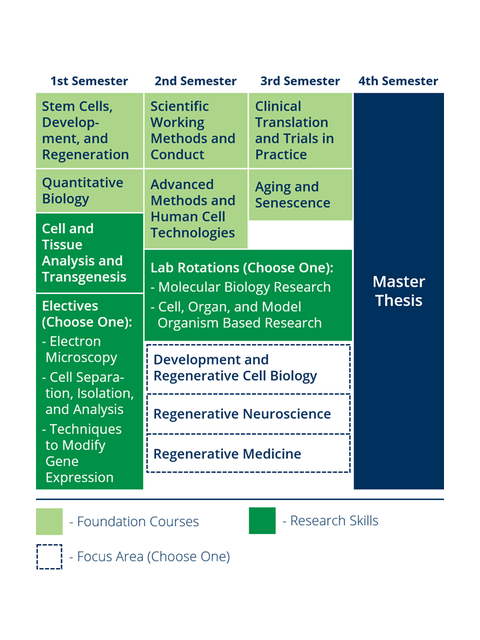Regenerative Biology and Medicine Curriculum
Table of contents
Experience a one-of-a-kind journey with the Regenerative Biology and Medicine program. Over four semesters, you will merge theoretical knowledge with practical, hands-on experience in the lab.
First Semester
The first semester offers foundations of regenerative biology, covering the fundamentals and giving you hands-on tools for your future research.
Stem Cells, Development, and Regeneration: you will learn the basics of stem cell biology, diving into fundamental definitions and concepts of the major stem cell systems, the theoretical and practical aspects of somatic stem cell biology, and the principles and molecular mechanisms underlying vertebrate development, organogenesis, and regeneration.
Quantitative Biology teaches methods for analyzing large and complex datasets and the principles of applied bioinformatics.
Cell and Tissue Analysis and Transgenesis: a hands-on course covering not only basic molecular biology methods but also introducing the principles of gene editing and genome engineering technologies such as CRISPR-Cas9. The course also touches on the practical applications of microscopy and flow cytometry.
Electives are a selection of experimentally-oriented courses such as:
- electron microscopy
- cell separation techniques and analysis using magnetically and fluorescence-activated cell sorting
- micromanipulation techniques for modifying gene expression or the genome
Second Semester
In the second semester, you will focus on the Scientific Working Methods and Conduct. The course prepares you for your individual laboratory project. You will learn how to critically reflect on the scientific results, plan and present laboratory projects, write project reports, scientific publications, and research proposals.
The course on Advanced Methods of Human Cell Technology dives deep into state-of-the-art cell technologies such as the generation and application of pluripotent stem cells and organoids.
In the second semester, you will have to commit to one of the three subject areas:
- Regenerative Cell Biology - offers in-depth knowledge of the central molecular and cellular mechanisms of development and regeneration of tissues and organs of the most important model organisms and the associated current experimental analysis methods.
- Regenerative Neuroscience - covers in-depth knowledge of cellular, molecular, systemic, and regenerative neurosciences and the associated current experimental analysis methods as well as the clinical concepts of diseases for which neuro-regenerative therapies exist or are in development.
- Regenerative Medicine - offers in-depth knowledge of the pathology of diseases and the affected organ systems as well as the associated clinical concepts of regenerative medicine including the translation process from bench to bedside.
Third Semester
During the third semester, you will dive into the topic of clinical research. The course Clinical Translation and Trials in Practice offers an overview of planning and conducting phase I-III clinical studies and deals with topics such as Good Clinical Practice (GMP). Good Manufacturing Practice (GMP). You will learn about how the preclinical data is gathered as well as what infrastructure is required for the clinical studies.
Building on the fundamental knowledge, the course on Aging and Senescence offers an exciting perspective on the future applications of regenerative biology and therapies.
Fourth Semester
The fourth semester is dedicated to a Master's thesis. You can choose from a variety of research topics and work in the excellent research environment of the Center for Regenerative Therapies Dresden (CRTD). You can also reach out to research groups at other TU Dresden departments, the clinic, or partner institutes.
Go back to the Regenerative Biology and Medicine page.

